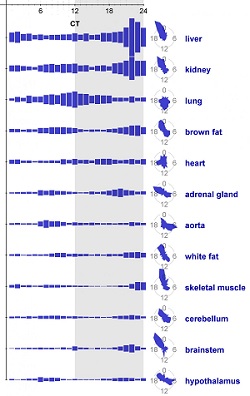 |
| Time of day when "clock" genes peak in each organ--Courtesy of UPenn |
In addition to being blockbuster drugs, Nexium, the Advair Diskus and Rituxan all have a half-life of fewer than 6 hours and target circadian genes, meaning that their efficacy could be influenced by the timing of their administration due to the so-called biological/molecular clock, according to University of Pennsylvania researchers.
And those three medications are not alone. Using RNA sequencing and DNA arrays to quantify the level of expression of 12 mouse organs throughout the day, the team determined that 56 of the 100 best-selling drugs in the U.S. target the product of a circadian gene.
"The genome is under much more clock control than we once thought," said former UPenn postdoc Michael Hughes, now a biology professor at the University of Missouri-St. Louis, in a UPenn news release. Hughes and colleagues found that the transcription into proteins of 43% of protein coding genes was influenced by circadian rhythms.
The team found wide discrepancies between organs, with the liver having the most circadian genes (3,186) and the brain's hypothalamus the fewest (642). In addition, 1,400 genes had a different patterns of expression depending on which organ it was operating in, and only 10 oscillated in all 12 organs, forming the body's "core clock." In generally the expression of circadian genes is highest during the dawn and dusk hours.
Knowledge of the circadian rhythms of various genes has strong clinical implications. Cancer, Type 2 diabetes, Alzheimer's disease, schizophrenia, Down syndrome, obesity and coronary artery disease are the diseases most closely associated with circadian genes, according to the team's paper in the Proceedings of the National Academy of Sciences.
The study marks advancement in chronotherapy. "At its core, this field aims to understand how the time of day influences the metabolism, efficacy toxicity and off-target effects of therapeutics," the paper explains.
Chronotherapy has already proven influential, leading to the insight that short half-life statins work best when taken before bedtime, because cholesterol is synthesized when we sleep. Similarly, aspirin should be taken at night when used to prevent heart attacks because of the oscillation of Ptgs1 gene expression, the paper says. In general, medications with short half-lives are more susceptible to circadian rhythms because they are available in the body for a shorter duration of time.
"Now we know which drug targets are under clock control and where and when they cycle in the body. This provides an opportunity for prospective chronotherapy," said UPenn professor of Systems Pharmacology and Translational Therapeutics John Hogenesch in the university news release.
Currently, the timing of drug delivery is not a highly considered factor. The articles says that "the influence of time of administration on the majority of pharmaceuticals on the today has not been extensively studied, and circadian effects are not an aspect of drug efficacy and safety trials."
- read the university news release
- here's the paper in PNAS